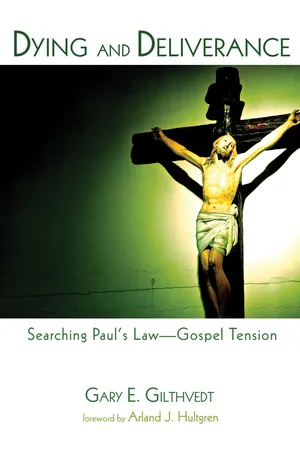
- 254 pages
- English
- ePUB (mobile friendly)
- Available on iOS & Android
About this book
The purpose of this book is a search for understanding of Paul's witness about the distinction between the Word of God as Law, and the Word of God as Gospel. To some this may sound strange. But the Letter to the Galatians, direct from the Apostle to one of the churches he founded, manifests the tension between law and gospel, along with their respective functions and unique purposes in the life of the church. The tension comes to light in Galatians 2:19. Paul preaches the tension's result, cast in terms of dying in relation to one side of the tension (law), and living in relation to the other (gospel). The Apostle's instruction responded to the conflicted life of the Galatian church. Now his message about the supremacy of God's redemptive act in the crucified Christ comes to us in our own time and throughout our own conflicted journey. Paul's message is a word on target for people whose religious struggle is, at bottom, theological and spiritual. This is the focal point of the book, Dying and Deliverance. Grace and peace to you in your study, and most of all, deliverance!
Tools to learn more effectively

Saving Books

Keyword Search

Annotating Text

Listen to it instead
Information
The Cross and the Law in Paul
Table of contents
- Foreword
- Preface
- Abbreviations
- Introduction
- Chapter 1: The Cross and the Law in Paul
- Chapter 2: Galatians 2:19
- Chapter 3: Galatians 2–3
- Chapter 4: End of the Law
- Chapter 5: Sacrifice and Deliverance in Galatians 1:4
- Conclusion
- Bibliography
Frequently asked questions
- Essential is ideal for learners and professionals who enjoy exploring a wide range of subjects. Access the Essential Library with 800,000+ trusted titles and best-sellers across business, personal growth, and the humanities. Includes unlimited reading time and Standard Read Aloud voice.
- Complete: Perfect for advanced learners and researchers needing full, unrestricted access. Unlock 1.4M+ books across hundreds of subjects, including academic and specialized titles. The Complete Plan also includes advanced features like Premium Read Aloud and Research Assistant.
Please note we cannot support devices running on iOS 13 and Android 7 or earlier. Learn more about using the app